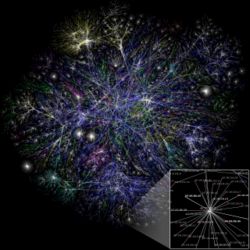Internet: Difference between revisions
imported>Eric M Gearhart |
imported>Eric M Gearhart (moving to subpage) |
||
| Line 22: | Line 22: | ||
*"History of the Internet" sites abound in various places on the Internet, as seen by this [http://www.google.com/search?q=%22History+of+the+Internet%22 Google search] | *"History of the Internet" sites abound in various places on the Internet, as seen by this [http://www.google.com/search?q=%22History+of+the+Internet%22 Google search] | ||
==References== | ==References== | ||
<references /> | <references /> | ||
Revision as of 13:49, 13 July 2008

The Internet is a "network of networks" best known as the global network the World Wide Web is run on. It is common to call the World Wide Web "the Internet" but this is not accurate. The Web is the Internet's best known and front-facing service; however there are literally hundreds of different protocols, applications and services that run over the Internet.
The research which led to the Internet was funded initially by the United States' Defense Advanced Research Projects Agency (DARPA), which was established in 1958 as the first U.S. response to the Soviet launching of Sputnik[1]. The first functional networks between individual computers were created in the early 1970s. Many educational institutions and corporations began joining the network, and in 1983 all nodes on the ARPANET changed over at once to Internet Protocol version 4 (IPv4), which is still in use on the internet today. While this is often called "TCP/IP", those are two distinct protocols: Transmission Control Protocol (TCP), and IPv4.
While IPv4 will be present indefinitely, it is limited in its capability for modern functions, and an evolution is in process to Internet Protocol version 6 (IPv6). Internally, the Internet is divided into Autonomous Systems, which exchange information about the destinations they can reach, using the Border Gateway Protocol (BGP).
History
1950s to 1970s
1975 to 1980
1980 to 1990
Impact on Society
External Links
- "History of the Internet" sites abound in various places on the Internet, as seen by this Google search
References
- ↑ Defense Advanced Research Projects Agency. United States government (2003). Retrieved on 2007-05-12.